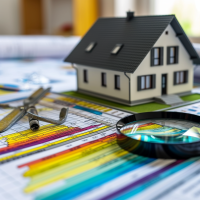Setting the right listing price is a critical step when selling your home. Price it too high, and you may scare away potential buyers; set it too low, and you might not get the value your property deserves. To help you determine the ideal listing price for your home, follow these steps:
1. Research Comparable Properties
Start by researching recently sold homes in your neighborhood that are similar in size, age, and features to your property. These comparable properties, also known as "comps," will give you a good idea of the current market trends and the prices buyers are willing to pay for homes like yours.
2. Consult a Real Estate Agent
Reach out to a local real estate agent who has experience selling properties in your area. They can provide valuable insights and a comparative market analysis (CMA) based on the current market conditions and the specific attributes of your home. A CMA will help you understand how your property stacks up against others in the market.
3. Consider Unique Features and Upgrades
If your home has unique features or recent upgrades that add value, take them into account when determining the listing price. These features can differentiate your property from others and justify a higher asking price.
4. Factor in Market Conditions
Evaluate the overall health of the real estate market in your area. In a seller's market, where demand exceeds supply, you might be able to set a slightly higher price. In a buyer's market, where there are more properties available than buyers, pricing competitively is crucial to attract potential buyers.
5. Calculate Costs and Margins
Take into consideration the costs associated with selling your home, such as real estate agent commissions, closing costs, and any necessary repairs or staging. Ensure you leave some room for negotiation, as buyers often expect to haggle on the asking price.
6. Don't Let Emotions Influence Your Pricing
It's natural to have sentimental attachments to your home, but try to detach emotionally when determining the listing price. Your emotional connection may not align with the market reality, leading to an inflated price that could deter potential buyers.
7. Review and Adjust as Needed
Once you've settled on a listing price, remain flexible. If your home doesn't receive much interest or if you receive feedback that the price is too high, be prepared to adjust accordingly. Pricing is not set in stone, and being adaptable can help you sell your home faster.
Remember, finding the right listing price requires a combination of market research, expert advice, and realistic expectations. By carefully assessing your property's value and market dynamics, you can confidently set a price that attracts potential buyers and maximizes the return on your investment.



